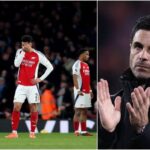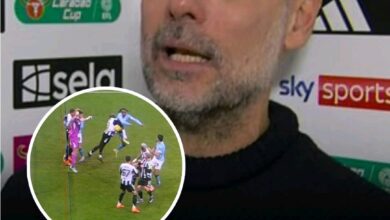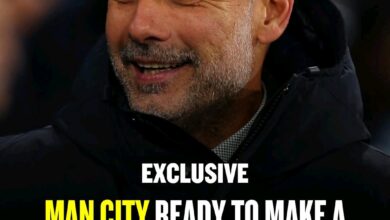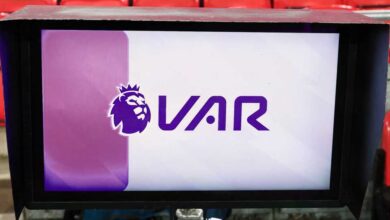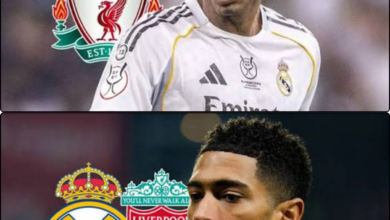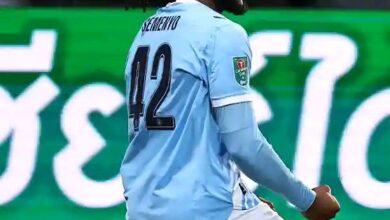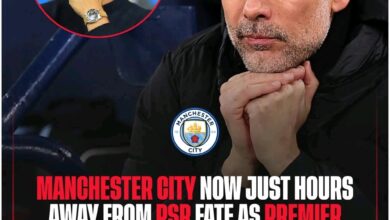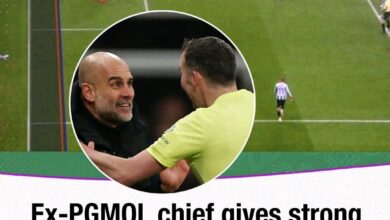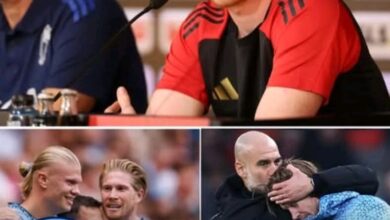5 Arsenal youth players join training pre-Real Madrid clash

In a significant development at London Colney yesterday, five promising Arsenal academy players were integrated into Mikel Arteta’s first-team training session ahead of tonight’s highly anticipated Champions League quarter-final second leg against Real Madrid. Max Dowman, Jimi Gower, Brayden Clarke, Seb Ferdinand, and Tommy Setford all participated in the session, showcasing Arsenal’s continued commitment to their renowned youth development philosophy even amidst the pressures of elite European competition.
This opportunity for the young Gunners arrives at a critical juncture in Arsenal’s season, with the squad facing a challenging injury crisis that has sidelined several key first-team players. With the tie against Madrid delicately poised, Arteta’s decision to incorporate these academy prospects demonstrates both necessity and the club’s enduring faith in its youth system—a cornerstone of Arsenal’s identity since the days of Arsène Wenger
The Gunners enter Tuesday’s crucial European fixture with a significantly depleted senior squad. Arteta currently has just 18 first-team players available for selection, including teenage sensations Myles Lewis-Skelly and Ethan Nwaneri, who have already made the breakthrough to the senior setup this season. This limited availability stems from an unfortunate combination of injuries and suspension that has left the Spanish manager with difficult decisions to make regarding his squad composition.
Arsenal’s absences for the Real Madrid clash include several crucial first-team regulars. Brazilian center-back Gabriel Magalhães is unavailable due to a hamstring issue sustained in the Premier League match against Brighton last weekend, while Italian defensive revelation Riccardo Calafiori continues his recovery from a knee problem. Versatile forward Kai Havertz misses out with an ankle injury that has plagued him in recent weeks, and Brazilian striker Gabriel Jesus remains sidelined with his recurring knee complications.
Japanese international Takehiro Tomiyasu is another notable absentee as he continues rehabilitation from a calf strain, while Raheem Sterling is unavailable due to accumulation of yellow cards in the competition, triggering an automatic one-match suspension. This combination of medical issues and disciplinary absence has created significant gaps in the Arsenal squad at the most crucial stage of the season.
With UEFA Champions League regulations permitting 23 players in the matchday squad, these absences have created potential opportunities for up to five academy players to experience the electric atmosphere of a European quarter-final night at the Emirates Stadium. This scenario perfectly encapsulates Arteta’s dual challenge: managing the immediate pressures of elite competition while continuing to nurture the next generation of Arsenal talent.
Among the five youth prospects training with the first team, Dutch youth international Tommy Setford appears guaranteed to make the matchday squad. The 18-year-old goalkeeper has been impressive for Arsenal’s U21 side this season, displaying remarkable shot-stopping abilities and composure beyond his years.
Setford’s inclusion is essentially a formality, as clubs traditionally include their third-choice goalkeeper in Champions League squads as insurance. Having already experienced the first-team environment during Arsenal’s Carabao Cup campaign, where he warmed up at Deepdale for the match against Preston North End last October, Setford has been gradually integrated into the senior setup throughout the season.
His development has been closely monitored by goalkeeping coach Iñaki Caña, who has reportedly been impressed by the young Dutchman’s distribution skills and command of his penalty area. While Setford is unlikely to see playing time against Real Madrid with David Raya firmly established as first choice and Aaron Ramsdale as his deputy, the experience of being involved in such a high-profile European night will prove invaluable for his continued development
The pathway to the matchday squad is more complicated for two of the five academy players involved in training. Max Dowman, a highly-rated attacking midfielder who has drawn comparisons to Martin Ødegaard for his creative vision and technical proficiency, is unfortunately ineligible due to age restrictions in UEFA competitions.
Similarly, Brayden Clarke, an explosive winger who joined Arsenal’s academy from Charlton Athletic less than a year ago, cannot be included in the senior squad as he hasn’t been at the club for the requisite period to qualify for UEFA’s List B, which allows clubs to register young players without occupying spaces on the main squad list.
Despite their ineligibility for the matchday squad, Arteta’s decision to include both players in training reflects his holistic approach to youth development. The experience of training alongside established internationals in preparation for a Champions League quarter-final provides invaluable learning opportunities that will accelerate their development, even if they cannot participate in the match itself.
Conversely, 19-year-old midfielder Jimi Gower is eligible for selection and appears likely to be included in the matchday squad. The technically gifted central midfielder has been a standout performer for Arsenal’s U21 side this season, contributing seven goals and nine assists across all competitions while demonstrating remarkable tactical intelligence and positional awareness.
Gower’s playing style aligns perfectly with Arteta’s technical philosophy, with his press-resistance and intelligent distribution making him a natural fit for Arsenal’s possession-based approach. Having represented England at U19 level, Gower has already demonstrated his capability to elevate his performance when surrounded by elite talent.
His potential inclusion in the squad represents another significant milestone in his development, having already made his senior debut in the FA Cup earlier this season. Arteta has previously praised Gower’s “exceptional football intelligence” and capacity to make “the right decisions under pressure”—qualities that could prove valuable if circumstances require his introduction against Madrid’s world-class midfield
Another eligible academy player in contention is central defender Seb Ferdinand. The 18-year-old recently signed his first professional contract with the club after impressing at academy level with his composed defending and precise passing from the back. Standing at 6’3”, Ferdinand possesses the physical attributes necessary for the modern game while maintaining the technical proficiency Arsenal demands from all its players.
Ferdinand’s development has been accelerated this season through regular appearances for the U21s, where his leadership qualities have been evident despite his young age. His inclusion in first-team training represents recognition of his progress and potential to eventually succeed the likes of William Saliba and Gabriel Magalhães in Arsenal’s defensive hierarchy.
With Gabriel’s injury creating defensive concerns ahead of the Madrid clash, Ferdinand’s presence in the matchday squad would provide emergency cover while offering him priceless exposure to the demands of elite European competition. Though unlikely to feature unless absolutely necessary, his inclusion would represent another positive step in his promising trajectory
An intriguing subplot emerging from Arsenal’s preparation involves striker Nathan Butler-Oyedeji, who was in action for the U21 side on Monday night against Tottenham Hotspur in a Premier League 2 London derby. Despite starting the match, Butler-Oyedeji was withdrawn after 60 minutes—a tactical decision that suggests he could be in contention for the first-team bench against Real Madrid.
This calculated management of his minutes indicates the coaching staff’s desire to ensure Butler-Oyedeji would be physically fresh if required for Champions League duty. The 20-year-old forward has been in prolific form at academy level this season, netting 14 goals across all competitions while demonstrating the intelligent movement and clinical finishing that has caught Arteta’s attention.
Having previously experienced first-team football during a productive loan spell at Accrington Stanley last season, Butler-Oyedeji has the physical maturity and competitive experience that could make him a viable option from the bench if Arsenal need to chase the game against Madrid. His pace and direct running could provide a different dimension to Arsenal’s attacking approach in the closing stages of a tight contest
If we assume the presence of Setford as third-choice goalkeeper, along with the eligible academy players Gower, Ferdinand, and Butler-Oyedeji, Arteta still has one remaining space in his 23-man squad. This final position could be filled in several ways, highlighting the tactical considerations the Spanish manager must balance.
One possibility involves the inclusion of a fourth goalkeeper, providing additional security in the most specialized position on the field. In this scenario, either Jack Porter or Alexei Rojas could be called up, with Porter appearing the more likely candidate given he was rested from Monday’s U21 fixture, potentially in preparation for first-team duties.
Alternatively, Arteta might opt to leave the 23rd spot vacant rather than calling up another academy player unlikely to feature in the match. This approach would reflect pragmatic squad management, recognizing that quality of options rather than quantity should be the priority for such a crucial fixture.
The final decision will likely depend on Arteta’s assessment of the specific tactical challenges presented by Carlo Ancelotti’s Real Madrid side, balanced against his desire to provide developmental opportunities for the club’s most promising young talents.
Arsenal’s willingness to integrate academy players into such a high-stakes environment isn’t simply a response to injury circumstances—it represents the continuation of a philosophical approach that has defined the club for decades. Since the days of Herbert Chapman, Arsenal has maintained a commitment to developing its own talent, with this tradition reaching new heights under Arsène Wenger and now being enthusiastically embraced by Arteta.
The current Arsenal manager has previously emphasized the importance of this developmental pipeline, stating: “The identity of this football club has been built around giving opportunities to young players. We must never lose that, even when competing at the highest level.”
This commitment is evidenced by the first-team breakthroughs of Lewis-Skelly and Nwaneri this season, following in the footsteps of Bukayo Saka and Emile Smith Rowe as academy graduates who have become integral components of Arsenal’s senior squad. The presence of these academy success stories creates a powerful aspirational pathway for the current generation of youth prospects, demonstrating that the journey from Hale End to the Emirates Stadium remains very much alive.
The potential inclusion of several academy players in a Champions League quarter-final squad illustrates Arsenal’s holistic approach to squad building—balancing high-profile signings with internally developed talent to create a sustainable competitive model
While the focus naturally falls on the youth prospects potentially joining the first-team squad, Arteta’s primary concern remains developing an effective tactical approach to overcome Real Madrid. The absences of key players like Gabriel, Havertz, and Calafiori necessitate tactical adjustments that could influence which academy players are ultimately selected.
Gabriel’s absence creates the most significant concern, removing Arsenal’s defensive cornerstone and aerial specialist. This could necessitate a reshuffling of the backline, with Ben White potentially moving to center-back alongside William Saliba, creating a vacancy at right-back that might be filled by either Jurrien Timber or a more conservative option.
In midfield, the continued absence of Tomiyasu limits Arsenal’s positional flexibility, while Havertz’s unavailability removes a key component of Arsenal’s pressing structure and transitional play. These absences could create opportunities for tactical innovation, potentially involving tactical roles for the more advanced academy players if circumstances demand.
The suspension of Sterling further complicates Arsenal’s attacking options, removing an experienced wide player with Champions League pedigree. This could create circumstances where a young attacker like Butler-Oyedeji might be considered for late-game impact, particularly if Arsenal need to chase the result.
Arsenal’s integration of academy talent for this crucial European fixture comes amid a season where the club has made significant strides under Arteta’s management. Currently engaged in a tightly contested Premier League title race and progressing to the latter stages of European competition, Arsenal are demonstrating their re-emergence as a genuine force in English and European football.
This revival has been built on a carefully constructed blend of experienced internationals, strategic signings, and academy graduates—a formula that balances immediate competitive needs with long-term sustainability. The potential inclusion of several youth players in such a high-profile fixture represents a microcosm of this broader approach.
For the young players involved, regardless of whether they ultimately make the matchday squad or see playing time, the experience of being integrated into first-team preparation for such a significant match provides invaluable developmental benefits. Training alongside established stars like Martin Ødegaard, Declan Rice, and Bukayo Saka offers technical and tactical education that cannot be replicated in academy environments.
As Arsenal prepare to face the challenge of Real Madrid in tonight’s Champions League quarter-final, the integration of academy talent into first-team training represents both pragmatic necessity and philosophical continuity. The identities of the young players who ultimately make the final 23-man squad will be confirmed shortly before kick-off, but their very presence in contention demonstrates Arsenal’s unwavering commitment to youth development even at the highest competitive level.
For Setford, Gower, Ferdinand, Butler-Oyedeji, and the other academy prospects involved in this week’s preparation, this experience represents another significant step in their development journeys. Whether they participate directly in tonight’s match or not, their integration into such a high-stakes environment provides the kind of educational experience that accelerates development and prepares them for future first-team opportunities.
As the Emirates Stadium prepares to host one of its most significant European nights in recent memory, the potential presence of academy graduates on the bench serves as a reminder that Arsenal’s future continues to be shaped by the talent emerging from Hale End. In the pressure-cooker environment of a Champions League quarter-final, Arteta’s willingness to include young talent represents a perfect embodiment of the club’s enduring philosophy: developing the stars of tomorrow while competing at the highest level today.
The full squad announcement expected later today will reveal exactly which of these promising young talents have earned their place in Arsenal’s matchday squad for this crucial European encounter. For those selected, it will represent not just recognition of their individual development, but also a powerful symbol of Arsenal’s continued faith in youth as a cornerstone of the club’s identity and competitive strategy.



